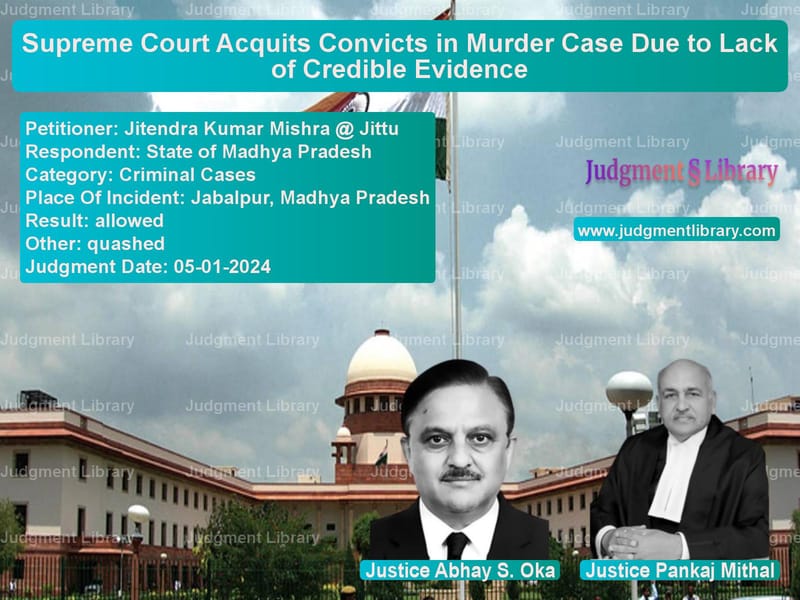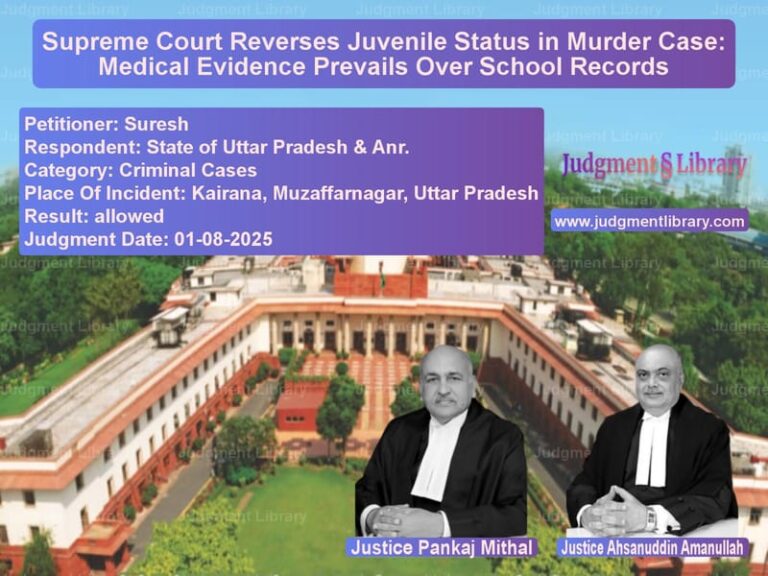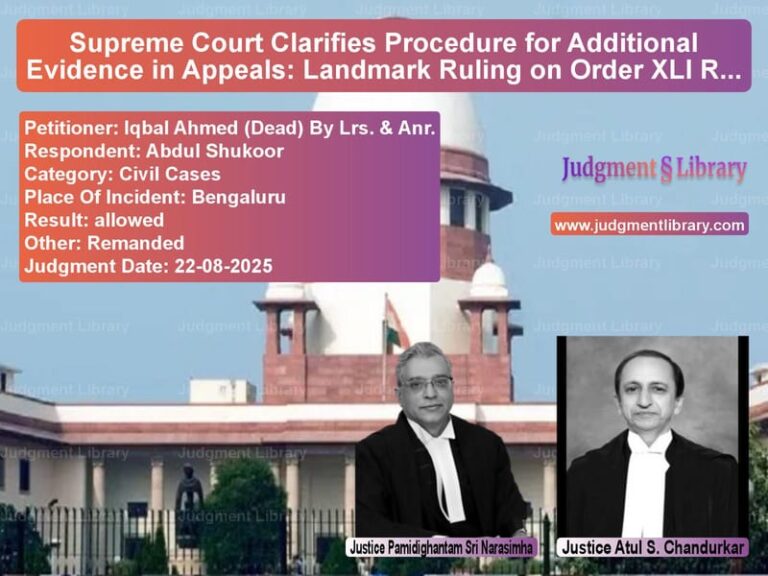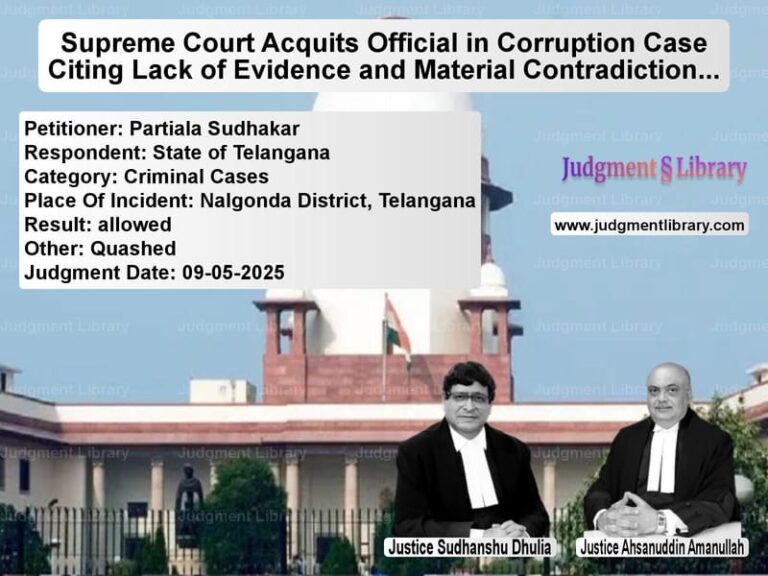Supreme Court Acquits Convicts in Murder Case Due to Lack of Credible Evidence
The Supreme Court of India, in its judgment dated January 5, 2024, acquitted the appellants in a murder case due to a lack of conclusive evidence. The Court ruled that the prosecution failed to prove their guilt beyond a reasonable doubt and granted them the benefit of doubt. This decision overturned the convictions and life sentences that had been upheld by the High Court.
Background of the Case
The case involved the murder of Pappu alias Rajendra Yadav on June 8, 2007, outside Machchu Hotel in Jabalpur, Madhya Pradesh. The accused, namely Manja alias Amit Mishra, Jitendra Kumar Mishra alias Jittu, Gledwin alias Banti Isai, and Ajay alias Ajayya, were convicted by the trial court under Section 302 read with Section 34 IPC and sentenced to life imprisonment with a fine of ₹5000 each.
The conviction was based on the alleged dying declaration of the deceased and the testimony of an eyewitness, Rahul Yadav (PW-13). The High Court upheld the conviction, leading the appellants to challenge the decision before the Supreme Court.
Key Legal Issues
- Whether the prosecution had established guilt beyond a reasonable doubt.
- Whether the alleged dying declaration of the deceased was credible and admissible.
- Whether the testimony of the prosecution’s eyewitness was reliable.
Petitioner’s Arguments
The appellants contended that the prosecution’s case was based on weak circumstantial evidence. Their counsel argued that:
- The alleged dying declaration was unreliable due to the severity of the victim’s injuries, which made it unlikely that he was in a position to speak.
- The key prosecution witness, Rahul Yadav (PW-13), had a criminal background and could not be considered an independent witness.
- The site map of the crime scene suggested that PW-13 could not have clearly seen the incident from where he claimed to be standing.
- Two other eyewitnesses, Virendra (PW-1) and Amit Jha (PW-12), did not support the prosecution’s case and were declared hostile.
Respondent’s Arguments
The State of Madhya Pradesh argued that:
- The deceased had clearly named his attackers in his dying declaration, and such declarations are admissible as evidence under Indian law.
- Even if some witnesses turned hostile, other circumstantial evidence pointed to the guilt of the accused.
- The medical evidence confirmed that the deceased suffered multiple stab wounds, which corroborated the use of sharp weapons by the accused.
Supreme Court’s Observations
The Supreme Court scrutinized the evidence presented and found major inconsistencies in the prosecution’s case:
1. Doubts on the Dying Declaration
“The injuries sustained by the deceased were very grave. The postmortem report revealed punctured lungs, excessive bleeding, and multiple deep injuries, making it improbable that he could have spoken to anyone.”
The Court noted that by the time the victim’s family arrived at the crime scene, he would have already succumbed to his injuries, making his alleged statement to his mother and brother highly questionable.
2. Unreliable Eyewitness Testimony
The Court also questioned the credibility of the eyewitness, Rahul Yadav (PW-13), stating:
“He is a person with a criminal background and has been charged under various offenses, including the Explosive Substances Act. His testimony must be treated with great caution.”
Additionally, PW-13 was not mentioned in the FIR, and his presence at the crime scene was doubtful since the victim himself did not refer to anyone trying to save him.
3. Hostile Witnesses and Lack of Corroboration
The two friends of the deceased, Virendra (PW-1) and Amit Jha (PW-12), who were initially named as witnesses, turned hostile and did not support the prosecution’s case. Their refusal to confirm the prosecution’s version further weakened the case against the accused.
4. Lack of Independent Evidence
“There is no specific material evidence to establish that the deceased was alive or in a position to speak when his brother and mother arrived at the scene.”
The Court found that there was no corroboration of the alleged dying declaration, which raised serious doubts about its authenticity.
Final Judgment
After evaluating all aspects, the Supreme Court concluded that the prosecution had failed to establish an unbroken chain of circumstances to prove the guilt of the accused beyond a reasonable doubt. The Court held:
“In the overall facts and circumstances of the case, we are of the opinion that the courts below ought to have extended the benefit of doubt to the appellants.”
The Court set aside the convictions and sentences of the appellants and acquitted them of all charges. The appellants, who were on bail, were ordered to be released immediately.
Key Takeaways from the Judgment
- Dying Declarations Must Be Reliable: If a dying declaration is not supported by medical evidence, it cannot be considered conclusive proof of guilt.
- Unreliable Witness Testimonies: Testimonies of witnesses with criminal backgrounds must be corroborated by independent evidence.
- Hostile Witnesses: If key prosecution witnesses turn hostile, the case becomes significantly weaker.
- Burden of Proof on Prosecution: The prosecution must establish guilt beyond a reasonable doubt; any major gaps or inconsistencies entitle the accused to the benefit of the doubt.
The judgment serves as an important precedent in cases relying on circumstantial evidence and underscores the necessity of proving criminal liability with certainty before convicting an accused.
Petitioner Name: Jitendra Kumar Mishra @ Jittu.Respondent Name: State of Madhya Pradesh.Judgment By: Justice Abhay S. Oka, Justice Pankaj Mithal.Place Of Incident: Jabalpur, Madhya Pradesh.Judgment Date: 05-01-2024.
Don’t miss out on the full details! Download the complete judgment in PDF format below and gain valuable insights instantly!
Download Judgment: jitendra-kumar-mishr-vs-state-of-madhya-prad-supreme-court-of-india-judgment-dated-05-01-2024.pdf
Directly Download Judgment: Directly download this Judgment
See all petitions in Murder Cases
See all petitions in Bail and Anticipatory Bail
See all petitions in Judgment by Abhay S. Oka
See all petitions in Judgment by Pankaj Mithal
See all petitions in allowed
See all petitions in Quashed
See all petitions in supreme court of India judgments January 2024
See all petitions in 2024 judgments
See all posts in Criminal Cases Category
See all allowed petitions in Criminal Cases Category
See all Dismissed petitions in Criminal Cases Category
See all partially allowed petitions in Criminal Cases Category







